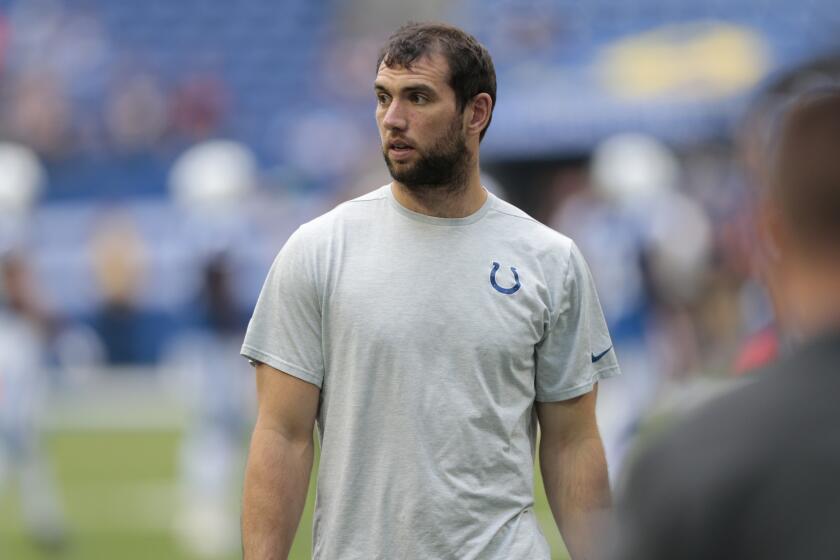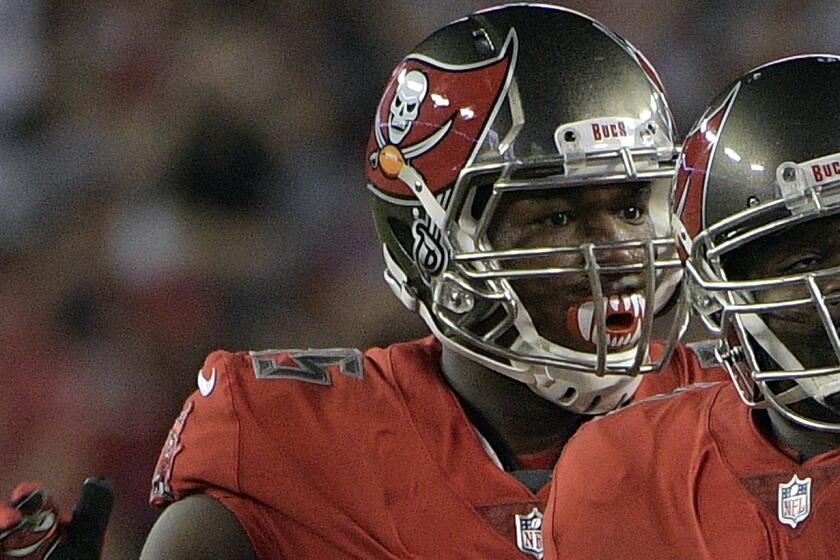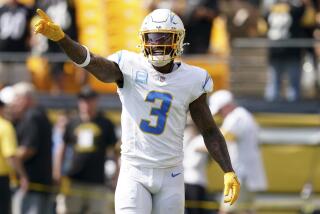Andrew Luck’s retirement, and pain he endured, hit close to home for former Charger
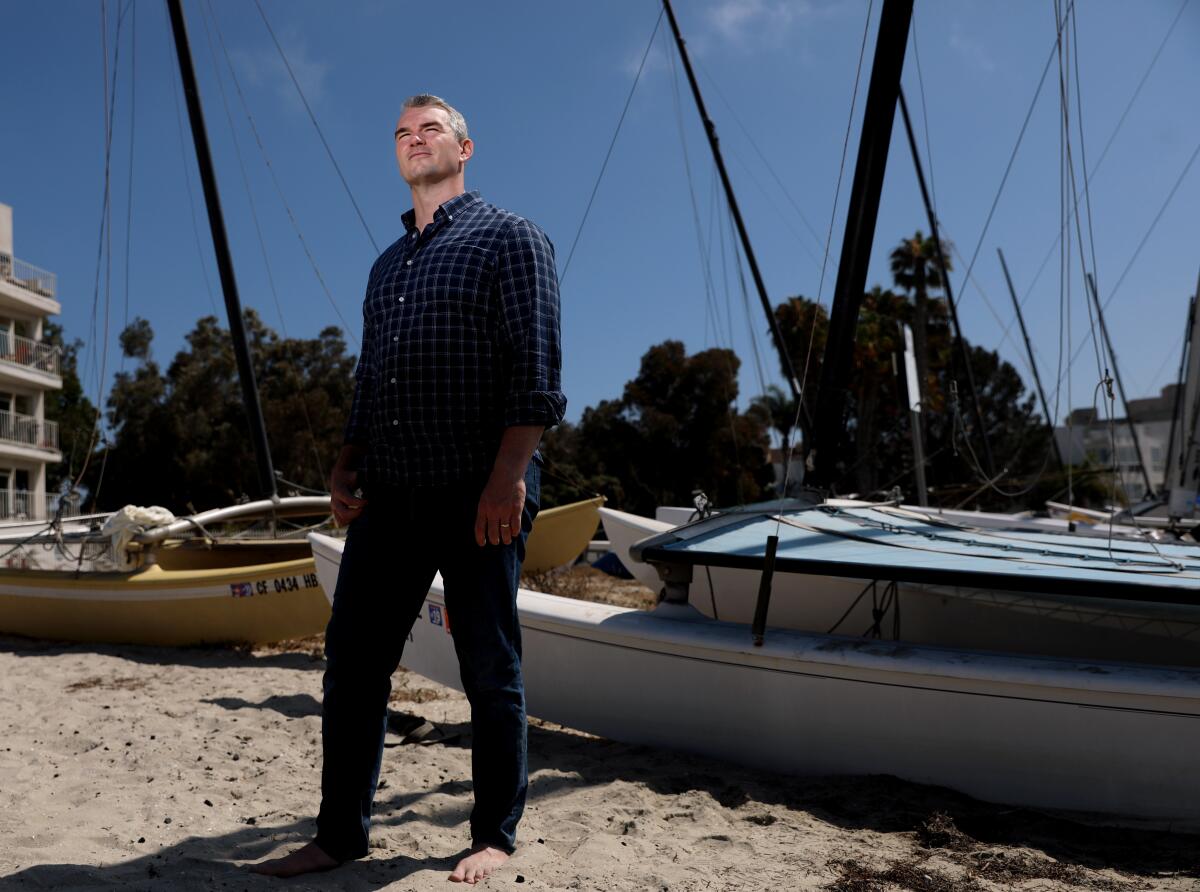
- Share via
When Andrew Luck recently announced his retirement, citing the physical and mental toll of coming back from injuries, NFL fans were stunned. Some NFL players, less so. One of them, former Chargers offensive lineman Rich Ohrnberger, 33, shared his experience with the Times:
I was dumbfounded when those fans booed Andrew Luck when news broke that he decided to retire. I couldn’t believe the reaction. I searched for a reason, and the only thing I could come up with is fans don’t have a good enough education on what an NFL player goes through behind the scenes.
What it’s really like when injuries pile up and their diminishing passion for the sport forces them to make the hardest decision they’ve ever made, the decision to walk away from the game.
I know. I’ve been through it.
I was drafted in the fourth round by New England in 2009. I spent three years with the Patriots, one with the Arizona Cardinals, and two more with the San Diego Chargers.
I was a 310-pound guard, and it’s the most anonymous position on the field. If you hear your name announced, it’s probably because you did something wrong.
Don’t confuse this as a call for sympathy. This is simply an education in a very representative NFL career. This is the rule, not the exception.
Indianapolis Colts quarterback Andrew Luck says an unrelenting cycle of injuries spurred his decision to retire from football at age 29.
I never had a real surgery before I got to the NFL. The closest thing was a procedure as a freshman at Penn State to repair a tendon in my pinkie. Lots of soft tissue injuries, ankle sprains and stuff, but never a major injury.
But immediately after my rookie season with the Patriots, I needed shoulder surgery. I had to have part of my clavicle removed on the left side, and a repair on a torn labrum. The clavicle joint was getting inflamed because my shoulder was getting so worn out.
This is how bad it got with my left shoulder: One time I was lying on the couch on my right side, and my left arm was draped across my belly. I reached to grab the TV remote with my left hand and my arm was quaking because I wasn’t strong enough to hold it up. I couldn’t handle the weight of the remote. I had to readjust so I could lift it with my right hand.
You get cortisone shots or whatever it takes to get through the season so you can get that surgery you so desperately need. So that’s what I did. You have a right arm; you don’t necessarily need both of them fully functioning.
That’s the funny thing about football. You have moments of exuberant joy when you realize all your efforts are going toward something bigger than yourself. But then you have those moments at home when you can’t lift the remote control off your body.
The next year, the same thing happened to my right shoulder, another labrum tear, and I needed my biceps reattached too.
When you’re an NFL player, you don’t complain about injuries. It’s out of respect for each other that you don’t really talk about them in the locker room. I’d rather not hear how your knee hurts, because my shoulder is killing me. I don’t want to hear how tough that hamstring pull is, because I tore my groin last week. Everybody has something.
You don’t ever complain to your coaches about injuries either, because they will think you’re weak. And you never, ever want to complain to family and friends, because you’re playing a kid’s game for a king’s ransom.
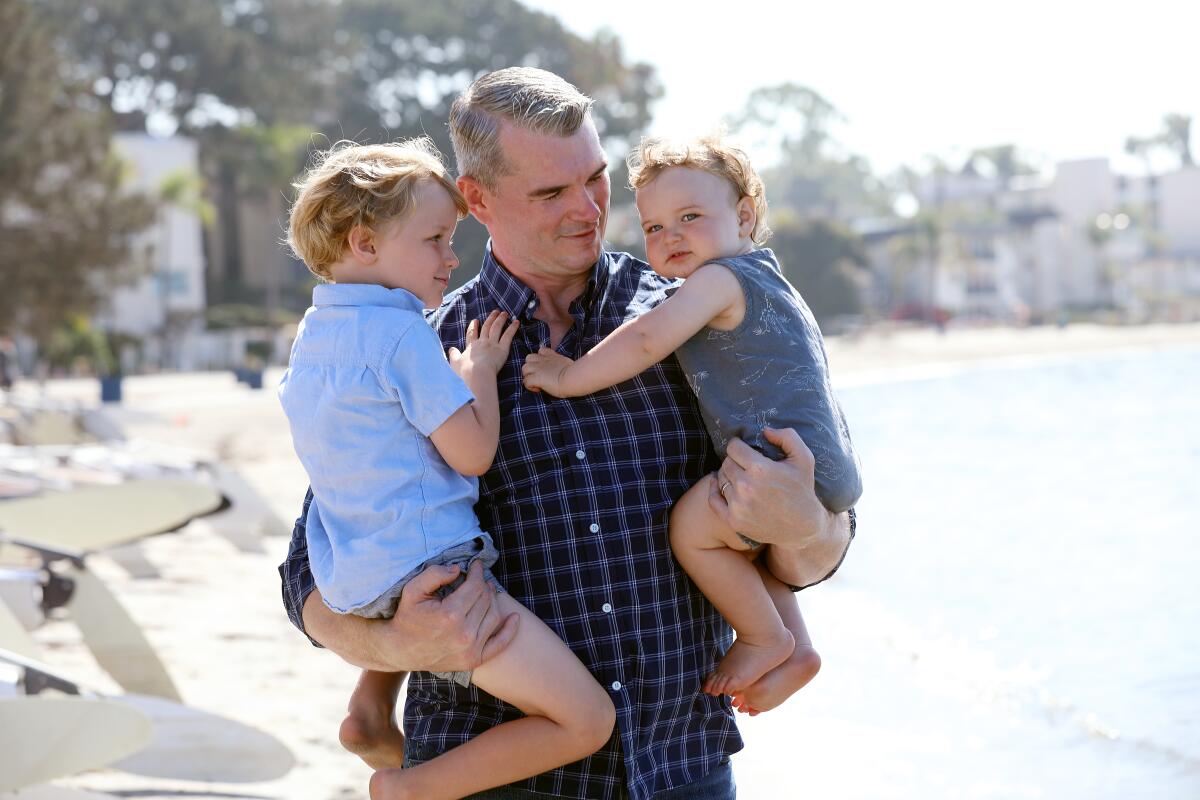
Pain, to a football player, is like sitting in traffic. It’s just part of your workday. It bothers you when you’re in it, but you don’t mention it unless it’s really bad. Just a part of the daily grind.
Let me take you back to my childhood. I wasn’t allowed to play football until the eighth grade. Finally, my mom let me. My coach said, “You’ve got to have tough knuckles, tough hands. You can’t be complaining about a jammed or broken finger. You have to have ‘em so tough you can’t even feel ‘em.”
I took that literally. So I went in our back yard where we had a pine tree. I’d punch it over and over to deaden my fingers. One day, my mom came out of the house because she heard the thunk, thunk, and saw the tree shaking outside the window.
“I’m trying to make my hands tough,” I told her. My knuckles were completely shredded and bleeding. We went back in the house and she was picking tree bark out of my knuckles. But as soon as my hands healed, I did it again. And again.
That was always my approach. If advice seems to make sense to me, I’d take that advice to heart and to the fullest extent. I assumed with hard work, success had to be on the other side of that good advice.
Now, I’m heading into my third season, and I’m playing with two surgically repaired shoulders. Me, the guy who never had a real surgery. The worst was yet to come.
My third training camp was going well until my final preseason game against the New York Giants. I was playing right guard, had pulled on a power play, and went head to head with an outside linebacker. The collision was so hard it broke my facemask. I saw stars. The lights went out for a moment, then faded back in.
I stayed in the game but was struggling to remember what the play call was when I was coming out of the huddle. Our quarterback would give us the play, but I’d forgotten once I got to the line of scrimmage. I kept tapping the center on the leg when we’d get into our stances: “What’s the call?”
A guy who doesn’t even play for the Indianapolis Colts anymore has a generous offer for angry fans who apparently bought season tickets only to watch Andrew Luck play.
As soon as I talked to the trainers, they pulled me off the field. I remember being in the training room on a table, and shortly thereafter, they put me on season-ending injured reserve.
It took a long time to feel right again. Nobody can see a concussion. It’s not like a shoulder or a knee, where it’s clear you’re limping around or can’t lift things. With a concussion, you’re waiting for your headaches to clear, or sensitivity to light to diminish, or loud noises to not bother you as much. You’re waiting for the confusion to pass and for your memory to return.
You wonder if it’s going to be forever, which is a scary thought. And then you keep wondering: Is this the concussion, or did I always used to be this way? It’s a really twisted road.
There’s isolation. You feel alone in your recovery, especially if it’s a team sport. If you get injured on the field in practice, they’ll just move the play up 10 yards and move on without you. It can become a dark place.
We went to the Super Bowl that season — we lost to the New York Giants — and later in February, coach Bill Belichick called and they released me. It was a long conversation, probably the longest one I ever had with Bill. We laughed. I told him he was making a huge mistake. I half-joked with him, “If you want to rethink this while we’re on the phone, I’ll accept your apology and we can pretend this phone call never happened.” He’s got a good sense of humor.
I hadn’t been cut from a team since basketball in middle school. But now I was damaged goods looking for a team. That’s a difficult place to be.
I went back to New York to live with my parents, trained at a local gym, and tried to figure out with my agent if it was time to do something else with my life. I had yet to fully get over the effects of the concussion.
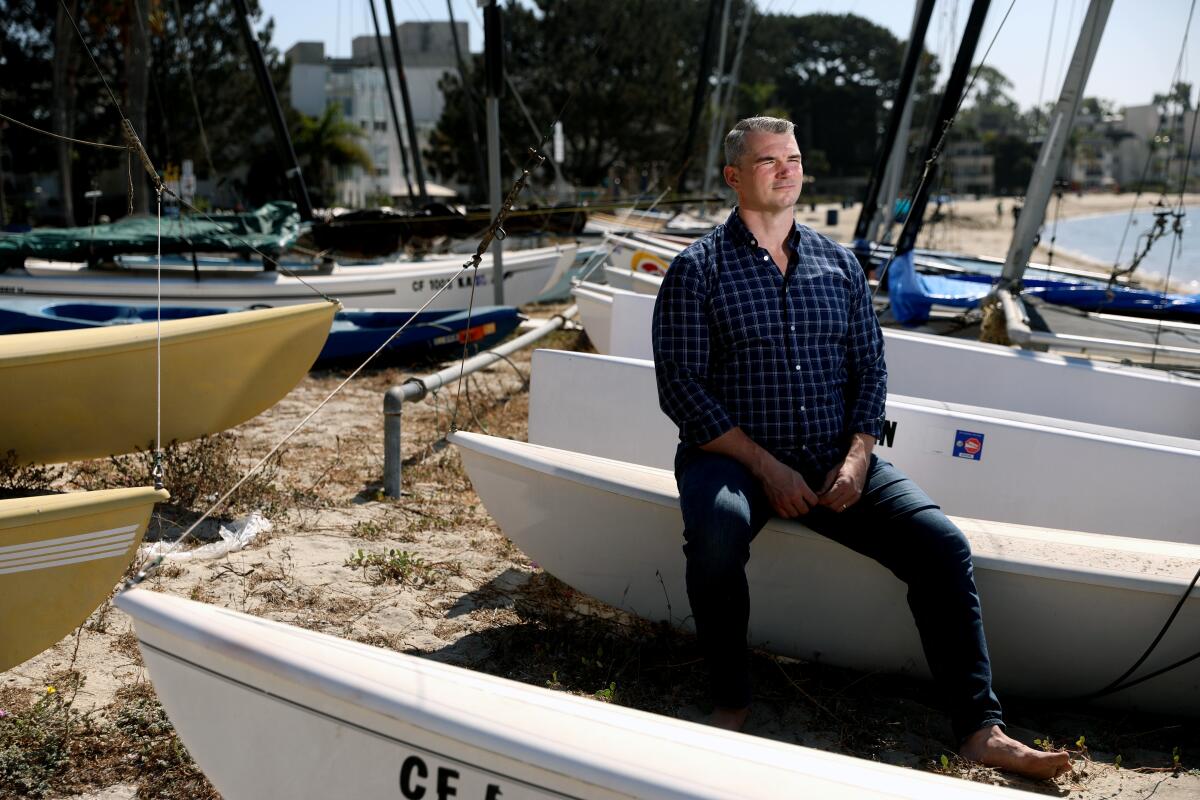
Recovery from that brain injury was probably the darkest time in my adult life. That fall brought forth one of the happiest memories I’ll ever cherish, asking the woman of my dreams to marry me. But I was so deeply depressed, there was a time when I considered if there was a better option than living.
I did everything to get over that concussion, including becoming a vegetarian for a while. Finally, I recovered enough to resume my football career. When I signed with the Cardinals that next summer, I had to sign something to release them from any liability for the head injury. So I signed on the dotted line, and I was off and running in training camp.
Without question, that was the best I performed in a camp. I was a former Patriot, so that earned me a lot of respect in the locker room. There were coaches throughout my career who asked me, “What’s Tom Brady like?” or “How is Bill Belichick in meetings?” It’s almost like being an Ivy League graduate. When someone says they went to Yale or Harvard, you make certain assumptions about their intellect. When it says Patriots on your resume, especially if they drafted you, there’s a respect that follows.
I was sort of a utility lineman on that team, stepping in wherever they needed me. Late in the season, I started a couple of games when our center went down. In a December game in Seattle, my adjoining offensive lineman blocked a big old defensive lineman right into the back of my legs. My knee popped. I knew exactly what ligament it was. I said out loud, “I just tore my MCL.”
So I left the field and went into the training room. While our trainer looked at my knee, I was watching the game on TV. I could see the center who had replaced me already messed up a snap. I was determined to get back out there to help the team.
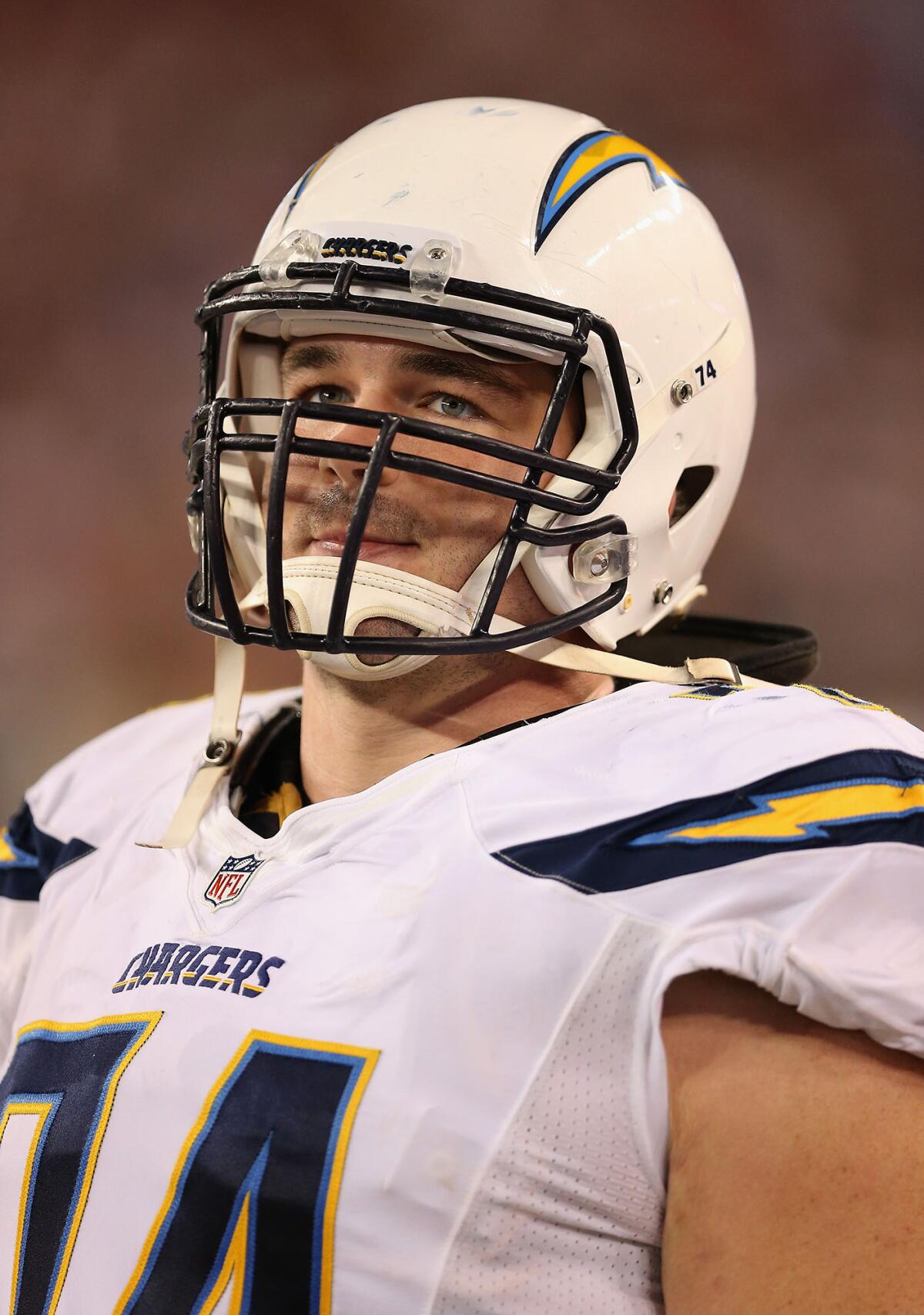
“Can you make an MCL out of tape?” I asked the trainer. He said I shouldn’t go back out, that I had torn my ligament. But I insisted. So he taped the knee and I finished the game. We lost that day, 58-0.
There were a couple reasons I was so hellbent on getting out there. For all I knew, that might have been my last time playing football. But more than that, I didn’t want our quarterback to get killed.
Even taking the knee injury into account, getting to start games for the first time in my career felt really good. My love for the game was renewed. Besides, recovering from an MCL isn’t bad. Hey, at least it’s not your head.
After that season, for the first time in my career, I had options. The Cardinals had fired their coaching staff, but Bruce Arians was coming in and wanted me to stay. I had an offer from the Chargers too, because Ken Whisenhunt became their offensive coordinator after the Cardinals fired him as coach.
I decided to go to San Diego. Turns out, the MCL recovery took longer than expected. It took a long time for me to get the strength back in my quadriceps. As soon as my knee started feeling better, I tore my groin. Those are some painful cortisone shots. You’re lying on a table, holding what’s important to you off to one side, and they’re plunging a four-inch needle into your groin, digging around. “Now is this the spot?”
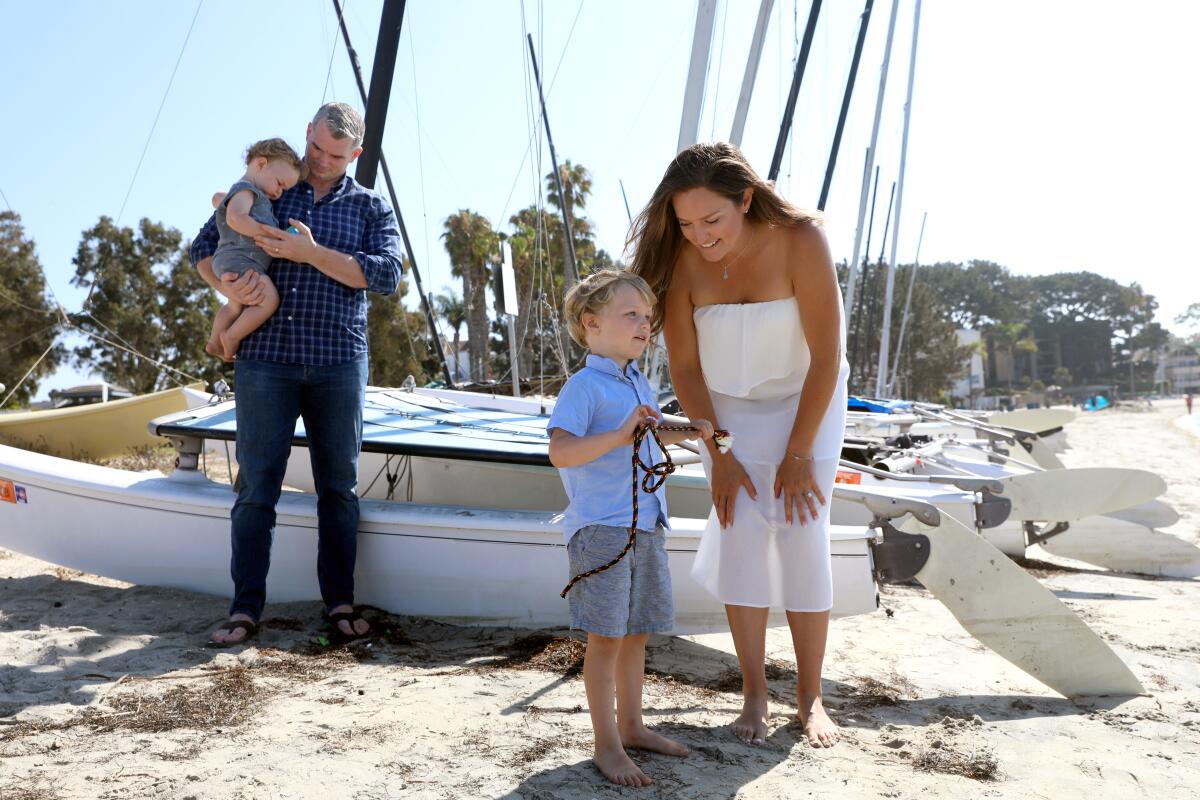
The mentality starts to become, just get to the end of the season. Just finish the sucker. Obviously, along the way you want to play the best you can and win a bunch of games. But it’s a race to season’s end.
Little did I know, that season would end on a high note for me. We snuck into the playoffs as a wild card, and opened the postseason with a rainy game in Cincinnati. About 20 plays into that game, our starting center, Nick Hardwick, has a major collision with Bengals linebacker Rey Maualuga. Nick got knocked for a pretty good loop. He was sword fighting someone who wasn’t even there. He was done for the day.
Nick left the field and I finished the game. I hated that he got hurt — I still hate it thinking about it now — but we wound up winning, and that was a special moment for me. Playing well and not letting my team down felt like a justification for everything I’d been through in my career. It was so meaningful.
When you’re at that point in your career, football can be like a toxic relationship. All your buddies are telling you she’s wrong for you. You’ve broken up several times. You’ve seen her running around with Johnny. He breaks her heart, she comes back to you, and you welcome her back. Everybody knows she’s not good for you. But you’ve got to stay with her. There’s just this allure, this draw.
Toward the end of that season in San Diego, I had started to have some severe pain in my lower back that radiated down my leg. I played through it, and I didn’t talk about it. I didn’t want another injury on my report. I just wanted to survive for another day, another game.
The pain was so bad at times that I stopped drinking fluids at dinner because it was too difficult to get up in the middle of the night to go to the bathroom.
That offseason, I married the best person I’d ever known. She had real concerns about my health. We would talk about whether or not I should keep playing and she would say, “I want you to do whatever you want to do, you’ve earned that.” Her eyes said different.
I re-signed with the Chargers and got through training camp and the early part of the season before I started having serious back spasms. The pain down my legs was indescribably bad, and I started having spells of temporary paralysis down my right leg. I’d be walking around in my normal life, or playing in games, and my leg would suddenly stop working. Feeling would return, usually within a handful of seconds, and I’d get on with my day.
There were some nights when I couldn’t sleep, and I would lay awake in bed, explosions going off in my lower back. There’s severe pain pulsing down my right leg and into my butt on the left side. I’m considering calling 911 or waking my wife because I can’t even move. And then you finally pass out. Your body just gives up. Every night I’d wait for that.
Somehow, I was still able to go to practice. I’d have to wake up at 4:30 to start my warm-up regimen so I’d be able to walk. My wife was in the first trimester of pregnancy with our son, and she’d get up and draw me a bath while I crawled across the bedroom floor to the bathroom. I was basically a slow-moving slug waiting for someone to pour salt on me.
Free agent Ryan Russell wants another NFL job. But he also wants everyone to know he’s bisexual. “Those two objectives shouldn’t be in conflict,” he said.
Just getting into the bathtub was a huge accomplishment for me. After an hour in there, soaking and stretching, I could get myself walking again. But throughout that season, I probably had five or six epidural shots, trying to manage the symptoms.
I started having these internal conversations: “Buddy, you might be doing damage that you won’t be able to recover from. How important is it to me to stay out there and keep going?” It almost feels like an accounting problem. If you’re still coming out in the black, you keep it going. But the day it starts coming out in the red, now you have more difficult decisions to make.
During that season, I hurt my right ankle. That’s the same side I was having the paralysis. My last game came against the Oakland Raiders, and I just couldn’t get any purchase from that right side. After the game, I had an MRI done on that ankle and discovered I’d torn a tendon. I just sort of felt like, “What’s next?”
There’s part of you that says screw it. You’ve damaged yourself this much, what’s another handful of games? At the same time, you look at the scattered disrepair of your body and have real concerns about the ramifications.
Later that season, Annie’s pregnancy was starting to show, and I started thinking, “For crying out loud, I want to be able to wrestle with that kid in there, or play driveway hoops with him, or stand on the sideline when he’s playing sports — and to be able to do that without concentrating on my own pain.”
So in December 2014, I decide to have back surgery. They take out a good chunk of my herniated disk, and it’s a pretty uncomfortable recovery. My time with the Chargers is over, and I’m not sure if I’m going to continue trying to play.
But come training camp time, I’m feeling pretty good. I tell my agent I want to start talking with some teams. I’m still not sure whether I want to play again. Maybe I should hang it up. I keep searching my soul: “Am I OK with this decision?” I talk to Annie about it all the time: “Am I doing the right thing?” She was in such a tough spot. She cares about me so much, but she also knows how deeply I care about football. She didn’t want to be the wedge.
I had workouts with the Buffalo Bills and Pittsburgh Steelers, but neither signed me. Then the phone stopped ringing. My son had been born, and I had plenty of time to throw myself into being a dad. I was quietly relieved.
Then the Detroit Lions got off to an 0-5 start. They flew me out for a workout, but when I got there, it was obvious they were bringing in a bunch of guys to send a message to the locker room. It was all a show.
When we got back to the hotel, I went into the lobby bar and ordered a steak and a bourbon. I just knew this was it. I knew I was done. I missed my boy. I missed my wife. I wanted to be done.
I called Annie. She asked me how the workout went. I caught her up on everything that happened during the day.
“I’m done,” I said. “I’m not doing this anymore ... That’s it.”
“Yeah,” she said. “I know.”
More to Read
Go beyond the scoreboard
Get the latest on L.A.'s teams in the daily Sports Report newsletter.
You may occasionally receive promotional content from the Los Angeles Times.

